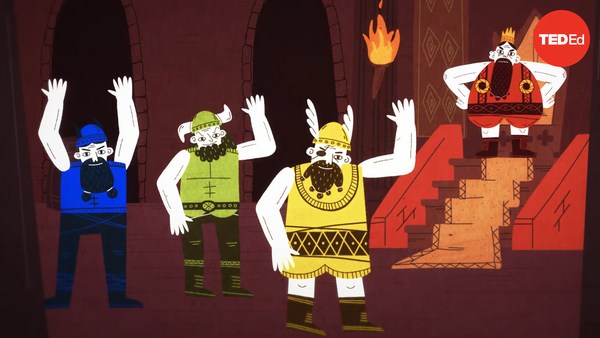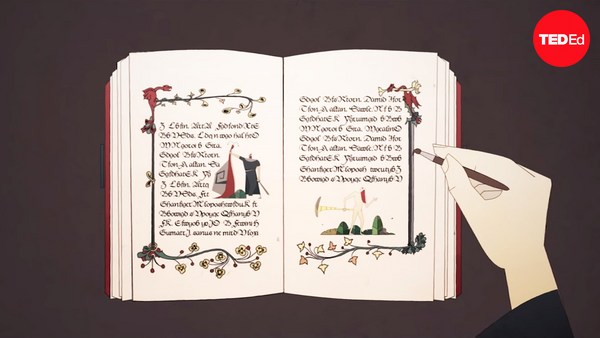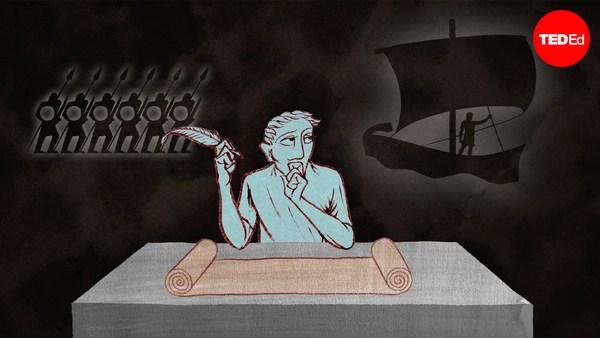In 1731, a fire broke out in London’s Cotton Library. To protect some of the world’s most prized manuscripts— including one-of-a-kind illuminated Bibles, centuries-old Arthurian literature, and even a copy of the Magna Carta— librarians frantically flung texts out of the windows. But while they couldn’t save everything, they did manage to salvage the only known copy of a strange Scandinavian poem. An epic written in Old English, “Beowulf” is known for its haunting monsters, dream-like language and paranoid perspective, in which violent threats are always waiting on the fringes of society.
The action begins in the great hall of Denmark, as King Hrothgar and his people celebrate what they hope will be the start of a peaceful new era. But in the marshy moors outside the city, a grisly monster lays in wait. Said to be a “misshapen man” descended from those who first unleashed evil into the world, Grendel was roused by the clamor of human joy. He burst into the hall, devouring anyone he could snatch. But while countless fell, his reign of terror was only beginning. Every night for the next 12 years, Grendel descended to feast on more unlucky souls.
Tales of Denmark’s plight stretched far and wide— but only one was bold enough to offer his aid. Beowulf, a prince of Geats from what is now Sweden, had a burning desire to perform great deeds. So he sailed the treacherous whale-road to help the Danes. And after a warm welcome. Beowulf stationed himself in the hall, waiting for nightfall. The moment Grendel flung open the doors, he seized the creature’s battle talons. As they wrestled, fixtures fell, goblets shattered, and mead benches exploded into splinters. Finally, Grendel gave a mighty wrench, tearing his own arm at the shoulder. Mortally wounded, he fled to his desolate swamp to die.
When the Danes saw Beowulf holding Grendel’s arm, they were overjoyed. But little did they know, an even deadlier beast was stirring. The next night, Grendel’s mother came to avenge her son, ripping through the celebrations and stealing her son's severed limb.
Ever the hero, Beowulf journeyed over endless moors and jagged rocks to track the bride of hell to her lair: a sinister lake infested with demonic reptiles. Beowulf fearlessly plunged into the water, sinking to the lake’s eerily dry bottom where Grendel’s mother lay waiting. The warrior quickly realized his sword was useless against the demon, and his fists were barely better. Then, as Grendel’s mother tightened her grip on Beowulf’s throat, his gaze fell upon a legendary blade. He recognized it as a giant’s weapon— so heavy that only a worthy man could wield it. Unfortunately for the monster, the prince was one such warrior. With a swift strike, Beowulf beheaded Grendel’s mother, flooding her lair with cleansing holy light.
Returning to the hall triumphant, Beowulf was hailed as the greatest hero in generations. But amidst the celebration, King Hrothgar cautioned the prince to stay humble and alert to evil— which he would not always be able to fend off alone.
Beowulf returned home and for decades ruled a peaceful kingdom. Yet after 50 years upon the throne, he began to feel a rising unease. Sure enough, violence was brewing on the outskirts of his realm. A servant had fled underground to escape his cruel master, disturbing a sleeping dragon in the process.
Knowing he could no longer defeat such a fearsome foe by himself, the king marshaled his soldiers. But his hand-picked warriors were too cowardly to fight. Only young Wiglaf, seeing his king in the heat of battle, rose to meet this challenge. The heroes dodged blasts of flame and talons sharp as sickles, until suddenly, the dragon snapped its fangs into Beowulf’s neck. Seeing his opportunity, Wiglaf punctured the beast’s belly. And as it howled in pain, Beowulf summoned his last ounce of strength to finish the dragon with a simple dagger.
With the monster gone and his final act of heroism complete, the King of the Geats passed his title on to Wiglaf— finally leaving the mortal plane to join his ancestors in the next great adventure.


